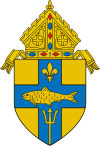Herman Joseph Alerding
Herman Joseph Alerding (April 13, 1845 – December 6, 1924) was a German-born clergyman of the Roman Catholic Church. He served as Bishop of Fort Wayne from 1900 until his death in 1924.
Biography
Herman Alerding was born in Westphalia and, during his infancy, came with his parents to the United States, where they settled in Newport, Kentucky.[1] He received his early education at the parochial school of Corpus Christi Church.[2] His local bishop, George Aloysius Carrell, did not accept him as a seminarian for the Diocese of Covington because he was unable to provide for his seminary expenses, and Alerding was instead accepted by Bishop Jacques-Maurice De Saint Palais of the Diocese of Vincennes.[3] He attended St. Charles Borromeo Seminary near Vincennes from 1858 until 1859, when the seminary was closed.[3] He then studied at St. Thomas Seminary in Bardstown, Kentucky, for a year before returning to Indiana in 1860 and entering St. Meinrad Seminary in Spencer County.[2] At the seminary he mentored student Paul Dresser and taught him to play a variety of musical instruments. Dresser later became among the most popular composers in the United States and authored the state song of Indiana.
After receiving the tonsure and minor orders in September 1865, Alerding was ordained to the subdiaconate on June 18, 1867, and to the diaconate on the following June 21.[2] He was ordained to the priesthood by Bishop Saint Palais on September 22, 1869.[4] He then served as a curate at St. Joseph Church in Terre Haute, while also attending to several missions throughout Parke and Sullivan Counties.[2] From 1871 to 1874, he was pastor of St. Elizabeth Church in Cambridge City.[1] While at Cambridge City, Alerding calmed a turbulent congregation which had been under interdict for several months, liquidated the parish debt, and purchased a site for a new church.[3]
He was transferred to St. Joseph Church in Indianapolis in 1874, there overseeing the construction of a church, rectory, and parochial school.[3] He briefly served as procurator of the adjoining St. Joseph Seminary until it was closed the following year.[2] In 1883, he published A History of the Catholic Church in the Diocese of Vincennes.[1] He was stricken by typhoid fever and took a trip to Europe in 1884.[3]
On August 30, 1900, Alerding was appointed the fourth Bishop of Fort Wayne by Pope Leo XIII.[4] He received his episcopal consecration on the following November 30 from Archbishop William Henry Elder, with Bishops Denis O'Donaghue and Henry K. Moeller serving as co-consecrators, at the Cathedral of the Immaculate Conception.[4] He presided over a diocesan synod in November 1903.[1] His pew-rent policy was expressly opposed by Archbishop Diomede Falconio, the Apostolic Delegate to the United States.[3] During World War I, he established the Fort Wayne Diocesan War Council.[3] In a pastoral letter issued in December 1918, Alerding declared, "We deserved the infliction of this terrible war and its awful consequences."[3] Under Alerding's administration, the number of diocesan priests nearly doubled from 109 in 1900 to 210 in 1925.[3] In 1900, the diocese had 102 churches with resident pastors, 39 mission churches, and 73 parochial schools; in 1924, there were 148 churches with resident pastors, 31 mission churches, and 106 parochial schools.[3]
Alerding died at age 79. He had been in critical condition since he was injured in an automobile accident on Thanksgiving Day.[5]
References
- ^ a b c d "Fort Wayne". Catholic Encyclopedia.
- ^ a b c d e Alerding, Herman Joseph (1907). The Diocese of Fort Wayne. Fort Wayne: The Archer Printing Company.
- ^ a b c d e f g h i j White, Joseph M. (2007). Worthy of the Gospel of Christ: A History of the Catholic Diocese of Fort Wayne-South Bend.
- ^ a b c "Bishop Herman Joseph Alerding". Catholic-Hierarchy.org.
- ^ "Bishop Herman J. Alerding". The New York Times. 1924-12-07.



